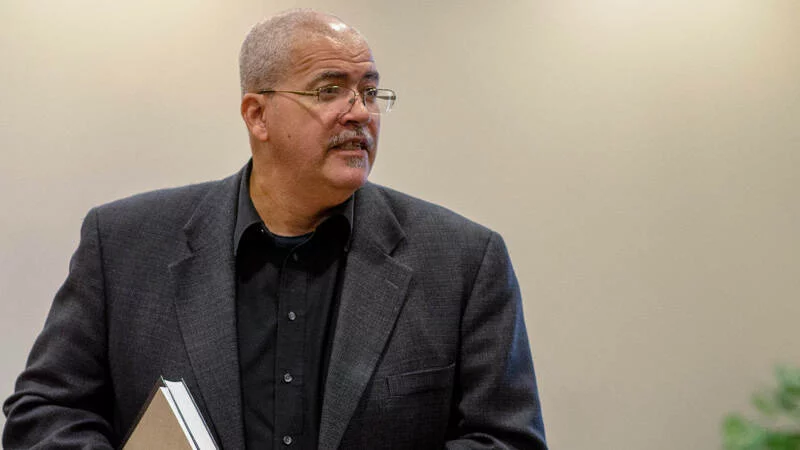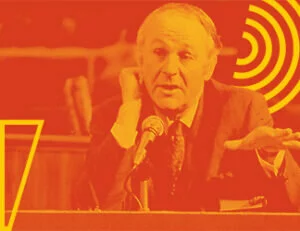I first met Bruce Fields in 1988 when I relocated from Southern CA to Arlington Heights, IL to become Sr. Pastor of the Orchard Evangelical Free Church. Bruce had just moved from teaching and coaching at Trinity College to teaching theology at Trinity Evangelical Divinity School. Within a few moments of meeting, we quickly became aware of how many interests and passions we shared: theology, basketball and tennis, Native American experience in the US, reconciliation ministries, doctoral study at Marquette University, and anything related to the local church. Bruce valued the work of a seminary but, in his estimation (and in mine), the lasting value of theological education only reaches as far as it serves local churches.
One of the first things I experienced in conversations with Bruce was that he did not countenance shallow talk about issues he deemed important whether they related to sports, church, family, or theology. This was especially true when our conversations touched upon people of color seeking to serve within evangelical organizations. I remember one of our first discussions during which I spoke boldly about my longing to participate in God’s promised vision for the church, i.e., of our eternal destiny as one family made up of people from every people, language, national, racial, and ethnic group. I think he appreciated my expressed desire to serve the furtherance of that vision. But, in my journal on 11/8/1988, I made note of what he told me, “Pastor Waybright, I don’t think you have any idea of what serving that vision would actually cost you.“Don’t preach this message unless you are ready to grow in understanding that.” There are no quick fixes or easy paths. It will require you facing kingdoms long established in this world and that are deeply entrenched in the church too. It will often demand that you live a life of dissonance alongside those marginalized not by God but by evangelical institutions.”
When I became President of Trinity International University/Trinity Evangelical Divinity School in 1995, Dr. Fields became more than a mentor. He became a partner in the gospel seeking to further God’s mission to become what we called a “kingdom community” at Trinity. Our first chat took place just before a chapel message I was to give from Eph 2:11-22. Bruce again reminded me that I would have to live personally in the midst of dissonance with those who serve as minority people in majority communities if I truly intend to be both a builder of bridges and a destroyer of walls as my preaching text called for. Before he prayed for me, he said, “Don’t preach this message unless you are ready to grow in understanding that.”
Introducing Black Theology
In the late 1990s, Bruce was already planning what would become his seminal publication, Introducing Black Theology: Three Crucial Questions, a book that would be published by Baker Academic in 2001. In it, he concisely spelled out both why “black theology” had emerged as well as why it was and still is necessary for the mission of the church. He demonstrated how black theology developed as a response to racism in the church. As such, it sought and continues to seek to make sense of the sociohistorical experience of African Americans who share Christian convictions with the majority evangelical church in America while, at the same time, living in tension with it. He wanted to validate the conviction that the struggle for justice expressed in black theology is consistent with the gospel that Jesus proclaimed and came to inaugurate.
In it, he concisely spelled out both why “black theology” had emerged as well as why it was and still is necessary for the mission of the church.
When I discussed these matters with him, Dr. Fields often spoke of two goals. First, for the evangelical church as a whole, he challenged us to have our theology formed by black theology’s “confrontational ministry,” i.e., one that confronts evil and injustice in order to bring about God’s kingdom of justice and peace. He was convinced that the only lasting path to forgiveness and reconciliation both for those who suffer and those whose acts trigger the suffering is calling out and confronting the personal and systemic reality of evil in this world. Second, Bruce wanted to encourage black theologians to remain faithful to and to operate within cardinal biblical and orthodox theological parameters.
Race, Justice, and the Church in the United States
I always appreciated how Bruce continuously matured in his walk with God and in his thinking, including his perspectives on race and racism in the church. Anyone who wants evidence of that should read his series of articles published in Sapientia. In them, Bruce reflected on theological and practical issues related to jubilee, lamentation, and justice. The foundation for his application of those themes is that all parties claiming to be Christian claim to share the conviction that 1) we have all sinned and need grace and that 2) through faith in Jesus, we have all experienced grace. This foundation leaves no room for arrogance. He called Christians who live in a racialized or racist cultural situation to begin conversations from that starting point realizing that the sovereign God of grace is at work in all things—even suffering—to bring about his ultimate good of a kingdom of justice and peace.
In light of that, regarding those who have used positions of power to operate within and benefit from historic systems like slavery and Jim Crow laws, he wrote,
It is appropriate to lament slavery in a radically inconsistent ‘Christian’ nation. It is appropriate to lament the ongoing effects of slavery such as Jim Crow laws and the perpetuation of racism in multiple personal and structural ways. There is certainly a logically consistent human perspective that calls for both hostile remembrance and for reparations in more than just monetary ways.
Then, to those who have suffered under such systems, Bruce wrote,
The Black community in the United States cannot contribute to Jubilee experience until it practices lamentation and moves beyond it. . . . Perhaps we can replace the whole sin theme (i.e., that those who cause suffering need grace while those who suffer do not) with God’s desire that certain lessons be learned even in the midst of unspeakable suffering in order to be prepared for the time when he may allow the sufferers to possess and administer authoritative power as a stewardship over others, yet before him.
To all who claim to follow Jesus, he concluded:
Being entrusted with power requires such wisdom and enabling, without which the perpetuation of injustice would continue regardless of who governs.
And, when Bruce received pushback from all parties concerned, as he inevitably did, he sought to learn from it. In his Sapientia article entitled Race, Lamentation, and Being Human: A Revision, I find one of the passages from Bruce’s writing that most beautifully reveals the godly man I knew:
I have come to a point in my shared explorations where I desire to revisit earlier reflections to do what may need to be done to correct, to nuance, to reformulate, or to make additions to what I have written. I cannot and should not deny what I have written, but like Augustine in his Revisions, I hope to be making progress in my thought and in the expression of my thought both in dialogue and in writing. . . . Through the grace of the Lord Jesus Christ, I am and am becoming a true image bearer of God. Lord knows, however, how much I personally struggle even with what I have just thought and written.
What gave Bruce hope that God’s people would someday experience a completed and satisfying reconciliation was his irrepressible confidence that God will complete what he has inaugurated in Christ. He called us to live now holding on to the eschatological vision of what God says the church is, as expressed in Rev 7:9, will in God’s timing be realized in spite of the kingdoms of this world that war against it. He wrote:
Eschatology arouses hope because it encompasses a vision of what God has done, is doing, and will do, namely, further his kingdom while ensuring justice. Black Theology is characterized by an activistic call to participate in God’s program, to work for justice in laws and policies in continuity with God’s activities. . . . The practicalities of life in the Black church make political engagement constant and critical.
It was because of that conviction that Bruce faithfully remained in an evangelical institution for over four decades. By doing so, God used him to open the eyes of majority people like me to the kinds of issues we would have to enter into if we will be participants in furthering God’s kingdom of justice and peace. Just as much, he became a mentor for countless minority students who loved Jesus but struggled with a church that ignored justice. He helped them stay anchored to historic biblical faith while, at the same time, enabled them to see that the battle against injustice is central to gospel-centered ministry.
A Life Lived to the Glory of God
While he carried out that role as an educator and scholar, he remained even more deeply committed to his wife, Mary, and to his four children. He loved God first. But, when he spoke of his family, his love for them radiated through his eyes and words. And, Bruce loved the church. Dr. Fields, the theologian, understood that his marriage, family, friends, and church are God-given priorities.Those of us whose lives have been stretched and changed by him mourn. Heaven rejoices. As Dr. Vincent Bacote wrote, “His life is a reminder that while there is value to the academic life, the more important is fidelity to our Triune God, to the church, and to our relationships.”
On July 17, 2018, Dr. Bruce Fields, was diagnosed with glioblastoma (an advanced and aggressive brain tumor). He underwent surgery to remove the tumor two days later. Then, for 21 months he battled that cancer even as he taught, mentored, and lived out his God-given callings until the Lord called him home. That physical battle was probably a lot like the battles he had to face as “the first” and often “the only” man of color in majority communities. He walked with faith and dignity through those struggles. Those of us whose lives have been stretched and changed by him mourn. Heaven rejoices.
Dr. Fields taught, mentored, coached, wrote and lectured about what a community will look like and be like when Jesus is truly the Lord. The impact of his life is something that goes on in me and in countless others. His was a life well lived to the glory of God.







Comments
Be the first one to make a comment!